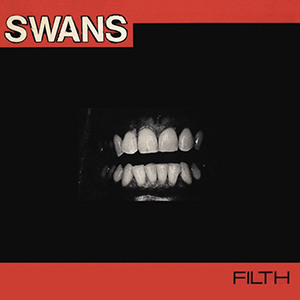Swans, "Filth" (deluxe reissue)
 Even with their reappearance in the past five years, the earliest days of Swans are the ones that are often cited as the most important and essential. It almost is a perfect example of the hipster cliché of "Oh I only like their EARLY material (or pre-Jarboe)". The fact is that Swans were amazing from their inception to today, and whatever stylistic shifts they made were brilliant, if sometimes drastic and unexpected. Amidst their always-expanding touring and recording schedules, Michael Gira has initiated a reissue campaign, beginning with an expanded version of their debut, Filth. A template for most heavy music that has followed, the originator is still peerless, and could be released today and be just as deserving of the accolades and admiration it has received since 1983.
Even with their reappearance in the past five years, the earliest days of Swans are the ones that are often cited as the most important and essential. It almost is a perfect example of the hipster cliché of "Oh I only like their EARLY material (or pre-Jarboe)". The fact is that Swans were amazing from their inception to today, and whatever stylistic shifts they made were brilliant, if sometimes drastic and unexpected. Amidst their always-expanding touring and recording schedules, Michael Gira has initiated a reissue campaign, beginning with an expanded version of their debut, Filth. A template for most heavy music that has followed, the originator is still peerless, and could be released today and be just as deserving of the accolades and admiration it has received since 1983.
Filth somewhat predates Swans at their most brutal, which is a sound that mastered on the Cop and Young God records.With Filth, there was still a vestigial trace of post-punk and no-wave inclinations that came through most clearly on the debut EP, which is included here for the first time since the first CD release of Filth.The first two discs of this collection of three captures the same material and bonus tracks of the Filth/Body to Body, Job to Job reissue that appeared back in 2000.While it was not in dire need, it does sound as if there has been a subtle remastering that gives the bass a little more force and power.
The material clearly set the stage for the big violent riffs and slow, lugubrious pacing that many associate with Swans, and were adapted by so many followers.The opening seconds of "Stay Here" make this abundantly clear, from the rusty bass pounding and squall of Norman Westberg's guitar noise into Gira's shouts of "Be strong!/Be hard!/Flex your muscles!" introducing one of the most angry, hate-filled (most often self-directed) records ever recorded.While it may superficially be a lumbering beast of detuned bass and clanging metal, "Weakling" actually disguises a blues shuffle that shows the influence artists like Howlin' Wolf had on the band even in those most dissonant days.
What sets Filth apart from what came later are the odd, uncharacteristic moments such as the almost danceable, snappy beat of"Big Strong Boss"; a tempo and a sound that was more in tune with their earliest work compared to what came later.The short "Freak" is another odd one:tape collages and treatments with Gira's manic ranting on top, closing with one of the best bass guitar attacks ever, all within the span of barely over a minute.Swans loosen up on "Right Wrong," with a more improvised feeling, but they never lose that aggressive thud of the rhythm section of Harry Crosby, Jonathan Kane and Roli Mosimann.
Disc two, Body to Body, Job to Job, acts largely as a compilation of early versions of Cop/Young God era material, unreleased songs, and work that was only performed live, not in the studio.Well-known songs such as "Half-Life" and "Cop" are not drastically dissimilar to their final forms, but have a slightly more raw feel that compliment the album versions extremely well.A song like "Seal it Over" captures the transition from Filth Swans into Cop Swans, displaying the latter’s penchant for slowly trudging structures, but the former's more experimental approach to using guitar as an accent rather than the primary focus.Interspersed throughout are tape loops that were used in live performances in the 1982-83 era and on their own capture the proto-industrial vibe they would return to on Greed and Holy Money.
The material on the third disc is what I was most interested in, having owned the previous compilation of the first two discs for a number of years.The debut EP features the elements that we all know and love as Swans, but with a different approach and style.The nervous bass, complex drumming and abrasive saxophone stabs of "Laugh" works perfectly as a distinctly American take on the early Factory sound.The same goes for the melodic bass lead "Speak," where the harsh guitar sound is more of a textural element, and Gira is singing, rather than the shout/scream he was so fond of on the early records.Moments of these songs could almost be the Talking Heads, if they were belligerent drunks rather than effete art kids.
Following the EP is a selection of live tracks from 1982-84, largely familiar songs in a live context.They might not be the best quality from a recording standpoint, but are still entirely listenable and make for some unexpected variations of familiar work.Obviously not professionally captured, the sound is more on-par with the rougher moments of Body to Body, Job to Job. "Big Strong Boss" is slowed down and sloppier, while "Clay Man" is a rolling storm of guitar noise rather than big sustained riffs.
The final three performances are a selection of songs from 1984 that would later appear on Cop and Young God, heralding that slow, pugnacious sound the band became most known for.The recording quality might not be optimal, but the over emphasized bass gives an additional layer of intensity to the already oppressive sound of "I Crawled" and the slow assault of "Why Hide".
Given that two of the three discs of this Filth reissue were themselves reissued only a handful of years ago, the interest for most Swans aficionados is going to be on the third disc’s rarer EP material and unreleased live content.Neophytes drawn in by the massive critical acclaim for To Be Kind will definitely find this a comprehensive, if daunting history lesson.Personally, I think the asking price is worth it alone for the remastered debut EP material.No matter what, however, this period of Swans has lost none of its impact or power three decades later.
samples:
 



